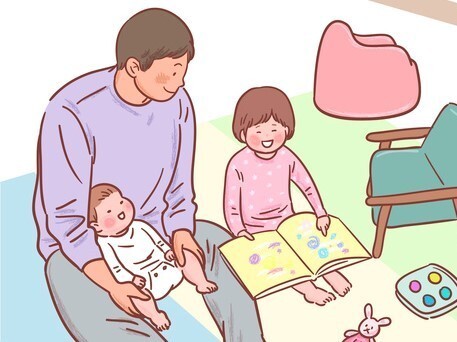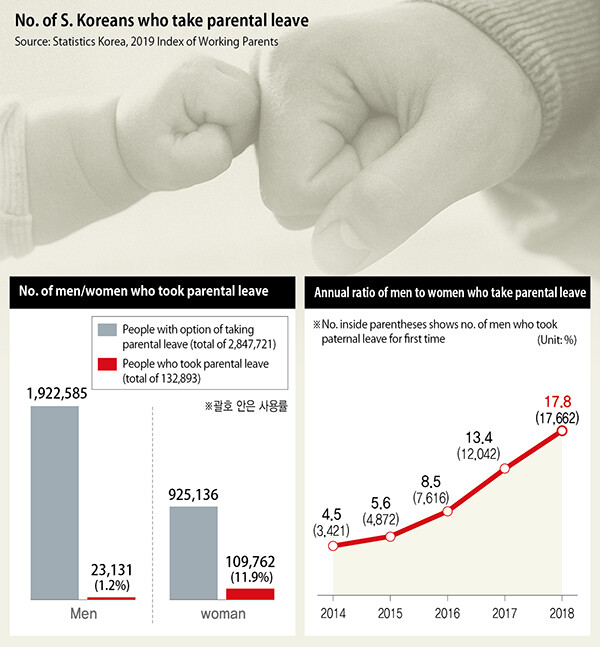hankyoreh
Links to other country sites 다른 나라 사이트 링크
Only 1.2% of men with option of taking paternity leave actually take time off

“At the beginning of my paternity leave, I realized that taking care of a baby is really hard — even harder than being at the office. It just seemed so hard to do the housework while looking after the baby. Before I took paternity leave, I would often get annoyed when the baby made a mess. In movies or commercials, you see [a dad] happily watching their kid scribbling all over the place with colored pencils. I’d assumed that was just something the movies had concocted, but [after taking paternity leave], I experienced those same feelings. Even when the baby was making a mess, I thought they were adorable. Those were the times when I felt happy.” — a 37-year-old worker at a construction company
Interviews conducted with men in their 30s and 40s who went on paternity leave when their wives returned to work over the past three years show that the men have gained an awareness of the physical and mental difficulty of childcare. They’ve also reported feelings of happiness during time spent with their children. But as of 2018, only 1.2% of men who had the option of taking paternity leave actually took it. The usage rate for maternity leave stood at 11.9%.

“Family and Workplace Experiences of Male Users of Paternity Leave,” a research report that appeared in the latest issue of the journal “Health and Social Affairs Review,” published by the Korea Institute for Health and Social Affairs (KIHASA), follows the experience of 14 men, born between 1978 and 1985, who went on paternity leave from companies in the private sector, generally when their wives returned to work after maternity leave. Four of these fathers took paternity leave for fewer than six months, and 10 for 10 months or more. In 11 of the 14 families, both spouses were working, and seven of the families didn’t have the option of receiving external assistance from grandparents or a nanny. Some of the men chose to go on paternity leave to get away from a challenging job or to ease marital conflict that had been aggravated by childcare.
The men’s main takeaway about childcare is that it’s tough going. It goes beyond the physical difficulty of not getting enough sleep and includes the frustration of young children’s unpredictable nature, resulting from the communication barrier. Men forced to take care of a child without any help from the outside reported intense feelings of loneliness, isolation, and guilt, resulting from the sense that they weren’t able to provide adequate care. The lesson here is that it can be painful for anyone, regardless of gender, to have to shoulder the entire burden of childcare.
Nevertheless, all the fathers interviewed — even those who reported emotional difficulties — said that spending time with their children brought them happiness. Having time to spend with their children helped them understand them as individuals with unique characteristics of their own. Even after returning to work, the fathers showed signs of change, feeling more of an affinity with “working moms” and taking steps to adjust their workload, so they could keep looking after their children.
In order to encourage more men to take paternity leave, researchers proposed that the government create a system under which fathers get one month of paid leave after childbirth. Currently, men are allowed 10 days of paid leave when their partner gives birth. But a minimum of a month is necessary to help their wife recover from delivery and to fully experience becoming a father, the researchers said. They also stressed that the system’s name should be changed to show that the leave isn’t purely for the benefit of the mother, but also for the father. The researchers also proposed that the government allocate funding to bring these benefits to irregular workers and the self-employed, who aren’t normally able to take paternity leave.
“Fathers are still latecomers to childcare, after mothers and grandparents. I think that setting aside a time when all fathers get to take part in childcare would have an impact on changing culture,” said Choi Sae-eun, a professor at the Korea National University of Education.
By Park Hyun-jung, staff reporter
Please direct comments or questions to [english@hani.co.kr]

Editorial・opinion
![[Column] Season 2 of special prosecutor probe may be coming to Korea soon [Column] Season 2 of special prosecutor probe may be coming to Korea soon](https://flexible.img.hani.co.kr/flexible/normal/500/300/imgdb/original/2024/0426/3317141030699447.jpg) [Column] Season 2 of special prosecutor probe may be coming to Korea soon
[Column] Season 2 of special prosecutor probe may be coming to Korea soon![[Column] Park Geun-hye déjà vu in Yoon Suk-yeol [Column] Park Geun-hye déjà vu in Yoon Suk-yeol](https://flexible.img.hani.co.kr/flexible/normal/500/300/imgdb/original/2024/0424/651713945113788.jpg) [Column] Park Geun-hye déjà vu in Yoon Suk-yeol
[Column] Park Geun-hye déjà vu in Yoon Suk-yeol- [Editorial] New weight of N. Korea’s nuclear threats makes dialogue all the more urgent
- [Guest essay] The real reason Korea’s new right wants to dub Rhee a founding father
- [Column] ‘Choson’: Is it time we start referring to N. Korea in its own terms?
- [Editorial] Japan’s rewriting of history with Korea has gone too far
- [Column] The president’s questionable capacity for dialogue
- [Column] Are chaebol firms just pizza pies for families to divvy up as they please?
- [Column] Has Korea, too, crossed the Rubicon on China?
- [Correspondent’s column] In Japan’s alliance with US, echoes of its past alliances with UK
Most viewed articles
- 1No good, very bad game for Korea puts it out of Olympics for first time since 1988
- 2Division commander ordered troops to enter raging flood waters before Marine died, survivor says
- 3Korea’s 1.3% growth in Q1 signals ‘textbook’ return to growth, says government
- 4Will NewJeans end up collateral damage in internal feud at K-pop juggernaut Hybe?
- 5[Column] Season 2 of special prosecutor probe may be coming to Korea soon
- 6[Editorial] Korea’s surprise Q1 growth requires objective assessment, not blind fanfare
- 7[Column] ‘Choson’: Is it time we start referring to N. Korea in its own terms?
- 8‘We must say no’: Seoul defense chief on Korean, USFK involvement in hypothetical Taiwan crisis
- 9Korea sees more deaths than births for 52nd consecutive month in February
- 10Is N. Korea threatening to test nukes in response to possible new US-led sanctions body?